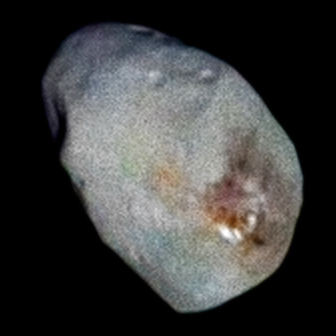
Nix (moon)
Nix is a natural satellite of Pluto, with a diameter of 49.8 km (30.9 mi) across its longest dimension.[3] It was discovered along with Pluto's outermost moon Hydra on 15 May 2005 by astronomers using the Hubble Space Telescope,[1] and was named after Nyx, the Greek goddess of the night.[10] Nix is the third moon of Pluto by distance, orbiting between the moons Styx and Kerberos.[11]
This article is about the moon of Pluto. Not to be confused with the asteroid 3908 Nyx.Discovery[1]
Hal A. Weaver et al.[a]
15 May 2005
Pluto II[1]
S/2005 P 2
Nictian (/ˈnɪktiən/)
48694±3 km
0.002036±0.000050
24.85463±0.00003 d
0.133°±0.008° (122.53°±0.008° to Pluto's orbit)
49.8 × 33.2 × 31.1 km[3]
(Geometric mean of 37 km)
(2.60±0.52)×1016 kg[4]: 10
1.031±0.204 g/cm3[4]: 10
≈ 0.0028 m/s2 at longest axis
to ≈ 0.0072 m/s2 at poles
≈ 0.0118 km/s at longest axis
to ≈ 0.0149 km/s at poles
123°±10° (to Pluto–Charon orbit)[8]: 11
48°±10° (to celestial equator)[b]
350°±10°[5]: 3
42°±10°[5]: 3
0.56±0.05[5]: 3
23.38–23.7 (measured)[9]
8.28[5]: 2
Nix was imaged along with Pluto and its other moons by the New Horizons spacecraft as it flew by the Pluto system in July 2015.[12] Images from the New Horizons spacecraft reveal a large reddish area on Nix that is likely an impact crater.[13]
Origin[edit]
Pluto's smaller moons, including Nix, were thought to have formed from debris ejected from a massive collision between Pluto and another Kuiper belt object, similarly to how the Moon is believed to have formed from debris ejected by a large collision of Earth.[21] The ejecta from the collision would then coalesce into the moons of Pluto.[22] However, the collisional hypothesis cannot explain how Nix maintained its highly reflective surface.[23]